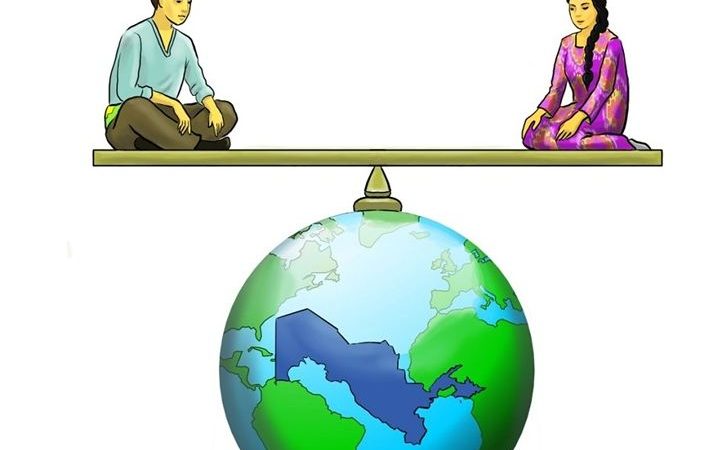Gender policy in Uzbekistan – an important criterion for ensuring human rights

Dilfuza Makhkamova
The main feature of a democratic society is the protection of human rights and the provision of equal opportunities for all in public life and administration. Gender equality is an essential component of this, as it ensures equal protection of rights and freedoms for individuals.
The Constitution of Uzbekistan states that all citizens enjoy equal rights and freedoms, regardless of gender, race, nationality, language, religion, beliefs, social origin or social status. Article 58 states that men and women have equal rights, and the state provides equal opportunities for both genders in managing society and state affairs.
These principles of equality and social justice are reflected in all laws and regulations, ensuring that everyone has equal access to opportunities and rights. This includes gender equality, which is essential for a fair and just society.
It should be noted that, in recent years, more than 40 legislative documents and important conceptual programs have been adopted within the framework of which efforts have been made to create equal rights and opportunities for women and men, strengthen the role of women in government and community leadership, provide necessary conditions for education, vocational training, employment, and create decent working conditions. These efforts also aim to increase women’s participation in economic life and protect them against various forms of harassment and violence.
In particular, the law “On guarantees of equal rights and opportunities for women and men” provides for the prevention of gender discrimination and the provision of equal participation for all in public administration. The Law on Protection of Women from Harassment and Violence establishes mechanisms to end various forms of violence against women and to provide protection and assistance to victims.
The “Strategy for achieving gender equality in Uzbekistan until 2030” approved by the decision of the Senate of the Oliy Majlis of the Republic of Uzbekistan on May 28, 2021, envisages a comprehensive approach to the implementation of the principle of equality between women and men in all spheres and levels of decision-making and implementation. Also, the strategy serves to ensure the promotion of gender equality in economic, political, and social life in order to create conditions for the realization of equal rights and opportunities for men and women and to observe fundamental human rights.
Due to this, gender policy in our country has become an important factor in society and state development. Concepts such as “gender equality”, “gender and development”, “gender balance”, and “the role of women in social and political life” are expressed in the development of program documents and all normative legal documents in our country.
In practice, the results are even more significant. In particular, the reason for the gender policy is that in the last seven years, the share of women in public administration in Uzbekistan has increased from 27% to 35%. In his speech at the 78th session of the United Nations General Assembly, the President of the Republic of Uzbekistan, Shavkat Mirziyoyev, summarized the systematic efforts to achieve gender equality in our country and noted that the share of women in public administration reached 35% for the first time.
Moreover, in our country, 32% of the deputies in the Legislative Chamber of the Oliy Majlis and 25% of the members of the Senate are women. The number of women entrepreneurs has doubled, and the number of women who have started their own business has exceeded 205 thousand. Hundreds of thousands of women were trained in trades and entrepreneurship. Among the population employed in health care and education, the share of women is 77 percent, in the economy and industry, it is 46 percent. The number of girls studying in higher education institutions has increased by six times; more than half of the students are women.
Uzbekistan has ratified the main international human rights treaties and conventions related to gender equality. Our country joined the Convention on the Elimination of All Forms of Discrimination against Women (CEDAW) in 1995 and undertook to eliminate discrimination and ensure the full development and well-being of women. Uzbekistan has also ratified the Beijing Declaration and the Platform for Action, which set strategic goals for achieving gender equality, and has been effectively fulfilling the relevant obligations.
Therefore, the systematic measures taken in this regard are duly recognized by the international community. In particular, in the World Bank index, Uzbekistan was listed among the 5 fastest developing countries in the world in the field of gender equality.
In addition, Uzbekistan ranked 18th out of 195 countries with a score of
69.7 in the “Open Data Watch” organization’s Open Gender Data Index, and was ranked among the “Top-20”.
In the policy of ensuring gender equality in the public service, increasing the weight of women in public administration, in particular, issues of forming a team of potential female leaders are of priority.
It should be noted that after the introduction of open competitions by the Public Service Development Agency, practically the same requirements were set for everyone. The human factor between the employer, personnel department representatives, and candidates was limited. Equal opportunities are guaranteed for all.
This, of course, further expanded the opportunities for women to enter the civil service. If we base our opinion on the numbers, earlier women made up
5-8 percent of those who entered the civil service, now women make up about
34 percent of the winners of the competition.
To be more specific, 2.1 million applications have been received in open competitions to date, of which 20% are women. 56,500 of our citizens won these contests, and 19,670 of them (35 percent) were women.
The first direction of ensuring gender equality in the personnel policy is to attract the most potential women to the civil service, to increase the attractiveness of the civil service for them, and the second major direction is to hire highly skilled people in the management of the civil service – “HiPo”(High potential) is to systematically prepare female personnel for leadership positions and to form a corps of “Women leaders”.
According to many sociologists, a professional leader is a person who has certain characteristics for successful management, regardless of gender. For effective management, it is not the role of the leader in gender relations, but the presence of professional competences such as the ability to correctly set priorities in solving the problem, to direct the team, and to fully achieve the goals based on the rational distribution of resources, is considered important.
However, due to the problem of vertical segregation, the low proportion of women in high-ranking positions, and the problem of the “glass ceiling”—invisible barriers to advancement our women have to work in more middle and senior management positions. As a reason for such a situation, we can point out the high responsibility of leadership, and for this reason, the professional qualifications, knowledge, and potential of women are not in accordance with the relevant leadership position.
In order to form specialists into good leaders, it is necessary to develop the necessary soft skills in effective work with personnel and making optimal decisions in management, development of human resources, innovation, critical and systematic thinking, and leadership competencies.
Therefore, our agency, in cooperation with the Family and Women’s Committee and the Academy of Public Administration, launched the “Women’s School of Leaders” educational program aimed at preparing the most potential women working in state bodies for leadership.
Until now, on the basis of this program, he has a high professional potential, is active in the implementation of reforms, and is active in various fields of public administration. The qualification of 145 women was improved.
At this point, it should be noted that by the Decree of the President of the Republic of Uzbekistan No. PF-81 dated March 1, 2022, the position of women activists was introduced in every neighborhood in all cities, towns, villages, and towns. In turn, through this, the President created a practical school for the formation of women leaders. Currently, there are about 9,400 women activists at the lower level, and 207 women are working as deputy governors, heads of family, and women’s departments at the middle level.
Those who have achieved the highest results according to the KPI system by the State Service Development Agency are included in the National Personnel Reserve and are purposefully prepared for senior leadership positions.
As a result of the above-summarized measures implemented on the basis of today’s gender equality policy, a unique national model of preparing women for leadership is being formed in our country.
In conclusion, a strong legal basis for gender equality policy has been formed in our country, and as a result of the full and correct implementation of these norms in life, we are making progress recognized by the international community. On this basis, it can be noted that gender policy in Uzbekistan serves as an important criterion for ensuring human rights.
Dilfuza Makhkamova,
Head of the Department of the Agency for the Development of Public Service under the President of the Republic of Uzbekistan Farangiz Avazbekova,
Chief Inspector of the Agency for the Development of Public Service under the President of the Republic of Uzbekistan; Doctor of Philosophy (PhD) in Law
Related News

US pauses green card lottery program
News Desk WASHINGTON: US Homeland Security chief Kristi Noem ordered the suspension of the diversityRead More

Pakistan Libya Defence Cooperation Strengthened During Official Visit
RAWALPINDI, DEC 18 /DNA/: Field Marshal Syed Asim Munir, NI (M), HJ, COAS & CDF,Read More


Comments are Closed